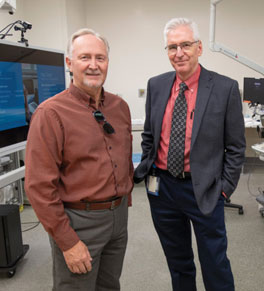AI colonoscopy detects precancerous polyps

Like most people, John Gifford wasn’t looking forward to a colonoscopy when he arrived on the UCI Medical Center campus in Orange in 2018.
The Riverside man, 65, was concerned about his family history of colorectal cancer and had dutifully scheduled an appointment with UCI Health gastroenterologist Dr. William Karnes.
The exam turned out to be intriguing and enlightening – a far cry from what one expects during a colonoscopy, Gifford recalls with a laugh.
A better colonoscopy test
While the day-before prep had been the same annoying process, the test itself featured new technology – pioneered by Karnes, associate clinical professor in UCI’s School of Medicine – that uses artificial intelligence to make screening easier and more accurate.
Running the AI program in real time during the exam, Karnes discovered two small precancerous polyps that might have been missed without the technology.
He removed them, reducing the risk that his patient will develop colorectal cancer anytime soon.
“It’s terrific to find these polyps so early,” Gifford says. “AI enhances your comfort level, and it helps reassure you that you’re getting the best care possible.”
Improved comfort during screening
The colonoscopy even seemed easier than the one he had undergone 10 years earlier, he says.
“It was pretty much painless,” says Gifford, who opted not to receive any anesthesia or moderate sedation and chatted with Karnes as both watched the computer screen.
“Normally, you wake up and get a report that’s written for your doctor. But when you’re going through this, you’re seeing the same thing the doctor is seeing. That enhanced the experience for me.”
Dedicated to beating cancer
Removing some of the mystery associated with the development of cancer – its randomness and complexity – is foremost on the minds of doctors and researchers on the UCI campus and at the UCI Health Chao Family Comprehensive Cancer Center in Orange.
It’s one of only 51 National Cancer Institute-designated comprehensive cancer centers in the nation.
That means patients can expect to receive the most advanced cancer care bolstered by a commitment to novel research – such as Karnes’ pursuit of AI colonoscopy – says Dr. Susan O’Brien, associate director for clinical science at the Chao Center and medical director of the Sue & Ralph Stern Center for Cancer Clinical Trials & Research.
“What we have here is a continuum from basic science research to being able to translate those discoveries in the lab to clinical trials,” she says. “That’s the benefit academic medical centers have that other hospitals don’t.”




